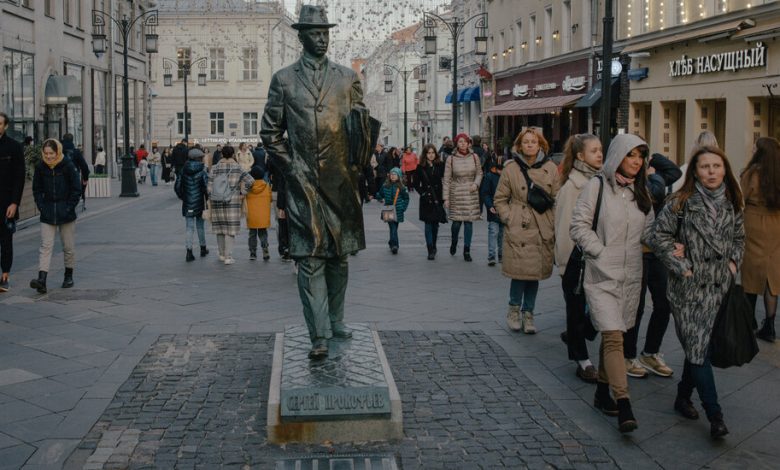Russia keeps its key interest rate steady amid worries of inflation.

Russia’s central bank kept its key interest rate at 7.5 percent on Friday, citing risks of increased inflation and restrained consumer demand as economists warned that the war in Ukraine and Western sanctions were continuing to sap productivity.
The Bank of Russia said in a statement that “the external conditions for the Russian economy remain complicated and significantly limit economic activity.” It said consumer prices rose at annual rate of 12 percent last month, pushed by a tight labor market that was accelerating wage growth.
The Russian economy has come under severe international sanctions in response to Moscow’s invasion of Ukraine, but it has defied expectations of a collapse unseen since the painful post-Soviet transformation in early 1990s.
On Thursday, President Vladimir V. Putin radiated confidence at a meeting with top government ministers in which he said the Russian economy would contract 2.5 percent this year, which is somewhat more optimistic than the International Monetary Fund’s estimate of a 3.5-percent shrinkage. Accusing the West of waging “an economic war” against Moscow and praising his government’s “responsible financial policy,” Mr. Putin said the country’s economy had avoided an outright collapse.
Still, some Russian economists predicted that the worst is yet to come. Yevgeny Nadorshin, the chief economist at the PF Capital consulting company in Moscow, warned that the Russian economy could now enter a deeper downturn that cannot be cushioned by increased government spending as before.
The State of the War
- The War in the Skies: Russia has resumed its drone attacks after a three-week lull, while the United States appears poised to send Ukraine a battery of Patriot missiles, its most advanced ground-based air defense system.
- The Next Front?: Using missiles and saboteurs, Ukraine is focusing on the strategically important city of Melitopol, ahead of an expected Ukrainian offensive to drive Russian forces from southern Ukraine.
- Aid for Ukraine: World leaders announced more than $1 billion in swift aid for Ukraine to repair vital infrastructure and survive what is already a brutal winter.
- Avoiding Questions: President Vladimir V. Putin will not hold his annual December news conference. The move comes as Russia’s economy falters and follows a series of military setbacks in Ukraine.
The mobilization of recruits to help fight in Ukraine, and an exodus ofsome highly skilled upper-middle-classworkers, would have a negative effect onproductivity, he said. In addition, the government’s increased focus on military spending will make the economy less productive.
“We are doomed to deal with a tough deficit of highly effective labor while sanctions limit our way to compensate for this in terms of imports of high-end technology,” Mr. Nadorshin said in a telephone interview.
In late February, after Mr. Putin’s decision to send troops to Ukraine, inflation surged in Russia, and the central bank more than doubled its benchmark interest rate, to 20 percent. Since then, it has cut the rate six times as inflation has eased and the bank tried to stimulate an economy dealing with increased isolation.
The central bank projected that annual inflation would decline to as low as 5 percent in 2023 and 4 percent in 2024.
Dmitri Polevoy, the chief strategist at Locko Invest, an asset management company in Moscow, said that sanctions would have a prolonged effect on Russia’s economy and that it was no longer important how much it will contract this year.
“What is interesting is how much deeper will the contraction be next year than what the government expects,” he said, noting that the widening budget deficit was turning into “the main headache” for the central bank.
Indeed, the Bank of Russia said Friday that the budget deficit might force it tighten its policyto control inflation.
For years, the Russian economy, and its tax revenues, relied on a huge exports of fossil fuels. But the country’s energy industry has been upended by the war in Ukraine, most recently by a European Union embargo on Russian oil and the Group of 7’s price cap on Russian crude, both of which took effect Dec. 5. Last week, Russia’s finance minister said the country’s budget deficit will reach 2 percent of economic output this year, up from earlier predictions of 0.9 percent, according to TASS, a state news agency.
The central bank noted that unemployment in Russia had dropped to a record low, partly because the mobilization of troops to join fighting in Ukraine had reduced the supply of available workers. In its Friday statement, the central bank warned that the conscription effort had forced employers to increase salaries.
Outside Russia, the effects of the war in Ukraine have manifested in soaring energy and food prices, pushing inflation in Europe, the United States and elsewhere far above levels that policymakers try to maintain. This week, the Federal Reserve, European Central Bank and Bank of England all raised interest rates and pledged to continue tightening their policies until stubbornly high inflation came under control, even as their economies show signs of slowing, if not outright recession.




